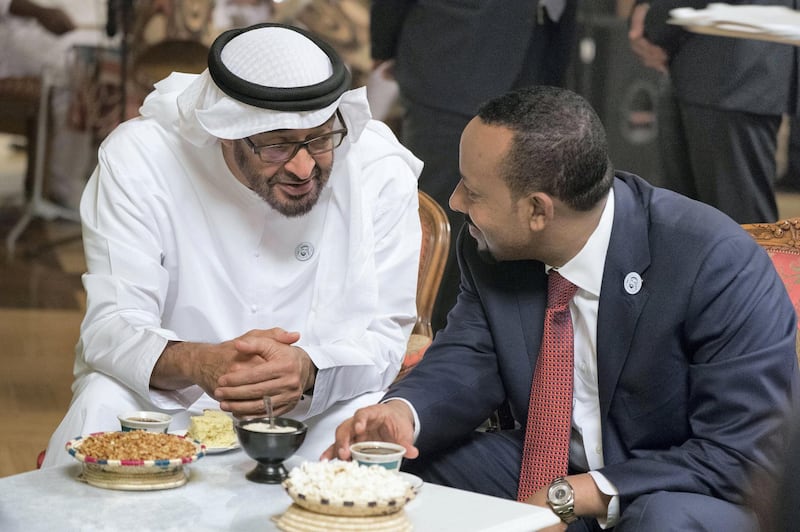The Abu Dhabi Fund for Development (ADFD) has pledged Dh11 billion in assistance to Ethiopia during a visit on Friday by Sheikh Mohammed bin Zayed, the Crown Prince of Abu Dhabi and Deputy Supreme Commander of the UAE Armed Forces.
It is a strong display of support for new Ethiopian Prime Minister Abiy Ahmad Ali who welcomed Sheikh Mohammed and a large delegation of UAE ministers to the capital Addis Ababa on Friday.
Dr Ali assumed office in April.
ADFD will deposit Dh3.7bn in the National Bank of Ethiopia to ease foreign currency shortages in the Horn of Africa nation, state news agency Wam said. “One billion US dollars will be deposited in the National Bank in a few days time to tackle the foreign currency shortage,” Ahmed Shide, head of Ethiopia’s Government Communications Affairs Office, told Reuters.
Large spending on infrastructure projects has contributed to a shortage of Ethiopia’s foreign currency reserves, which had reached less than one month’s worth of imports, analysts told Reuters.
The remaining Dh7.3bn is intended to stimulate the Ethiopian economy and encourage joint investments.
“I was pleased today to arrive in Addis Ababa, a city of history, civilisation and cultural diversity,” tweeted Sheikh Mohammed. “I am even more delighted to enhance ties of friendship and cooperation between our countries.”
Dr Ali drove Sheikh Mohammed around Addis Ababa on Friday afternoon for a personal tour.
Tourism, renewable energy and agriculture will benefit from a series of agreements signed in the presence of Sheikh Mohammed and President Ali at the Jubilee Palace on Friday.
“In addition to helping Ethiopia overcome the challenges it faces, the funding will encourage the UAE private sector to enter the Ethiopian market and benefit from the investment opportunities it offers,” said Mohammed Al Suwaidi, director general of ADFD.
He signed a Memorandum of Understanding outlining the terms of the funding in the Ethiopian capital with Teklewold Atnafu, National Bank of Ethiopia governor.
One agreement stipulates that holders of diplomatic passports in the two countries will be exempt from pre-entry visa requirements.
Another established the formation of a joint consular committee that will improve the exchange of information and co-ordination on consular affairs, and address concerns of citizens between the two countries. This was signed by Sheikh Abdullah bin Zayed, the Minister of Foreign Affairs and International Co-operation, and his Ethiopian counterpart, Workneh Gebeyehu.
The UAE delegation included investors interested in real estate and hospitals, Mr Shide told Reuters.
Agreements on trade, economic and technical co-operation were signed by Sultan Al Mansouri, the Minister of Economy.
A strong foundation for cultural exchange, particularly in the field of antiquities, arts and libraries, will be developed based on an agreement signed by Noura Al Kaabi, Minister of Culture and Knowledge Development, and Fozia Amin, Ethiopia’s Minister of Culture and Tourism.
___________
Read More:
UAE and Ethiopia close to bilateral agreement to protect domestic workers
DP denies out-of-court settlement in Djibouti port dispute
Abu Dhabi's Development Fund invested Dh1.4bn in 11 projects last year
___________
Ethiopia has the second largest population in Africa, estimated at 102 million citizens in 2016. There are currently 140,000 Ethiopian residents in the UAE.
It is both the fastest growing economy in the region, with a growth rate that averaged more than 10 per cent between 2005 to 2015, and one of the poorest, with a per capita income of Dh2,976. But extreme poverty has declined from 33.5 per cent in 2011 to about 8 per cent, according to the World Bank.
Gulf states have invested heavily in the Horn of Africa and the Red Sea. Large quantities of crude oil travel through the Suez Canal.
In March, Qatar announced a Dh14.69bn plan to develop the Sudanese port of Suakin on the Red Sea.
The UAE has invested in Djibouti, Somaliland and Puntland, and has a growing presence on the Yemeni archipelago of Socotra, off the coast of Somalia.
Since 2012, the ADFD has given Dh36.7 million to help finance an 80 kilometre road that serves the Oromia Region in the west of the Ethiopian Highlands. In 2013, the UAE was one of three Gulf states to pledge Dh44bn to a government that ousted a president from the Muslim Brotherhood.
Last weekend, Dr Ali visited Egypt, which was at odds with Ethiopia over the construction of a dam the country is building on the Nile.






